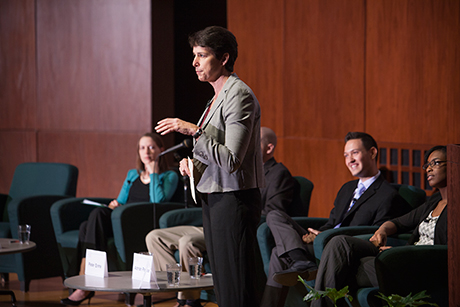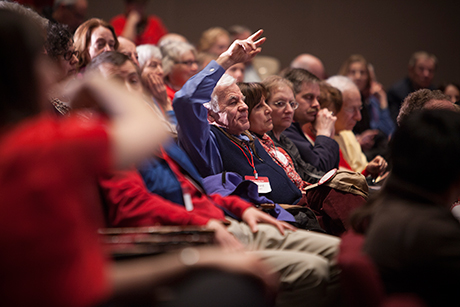Securing American dream takes work on many fronts
By Kathy Hovis

A panel of social scientists from the College of Arts and Sciences and recent alumni shared the latest research into inequality and some solutions to improve the situation for coming generations April 25 as part of Charter Day Weekend.
Panelist Adrian Palma ’13, who grew up as an undocumented immigrant in El Paso, Texas, said his parents were staunch believers in the dream that their son could gain legal status through education and hard work.
“To me, the American dream is the ability to know who you are, what you want to fight for and what you stand for,” said Palma, a co-founder of the Cornell Deportation Relief and Education for Alien Minors (DREAM) team and an entrepreneur in Washington, D.C., and El Paso.
“The good news is that 83 percent of all adults today have higher incomes than their parents did at the same life stage,” said sociology professor Kim Weeden, director of Cornell’s Center for the Study of Inequality.
The bad news: This is no longer true for young adults. Weeden’s research shows students from low-income families may lack the cultural knowledge of students from higher income families. For example, although low-income students may aspire to be a doctor or lawyer, they aren’t as likely to know how much education it takes and are less likely to make educational decisions that will help them become doctors or lawyers than higher-income students.
Research from panelist Kendra Bischoff, assistant professor and the Richard and Jacqueline Emmet Sesquicentennial Faculty Fellow in sociology, shows families are becoming more residentially segregated by income, which may exacerbate educational advantages and disadvantages.

Bischoff said recent research shows public schools can address educational inequalities by keeping high-quality kindergarten teachers, high-dosage tutoring and increased instructional time for at-risk students, and social-psychological interventions to help students gain confidence in their abilities.
The study of inequality at Cornell is more popular than ever, Weeden said, with more than 100 students each year now pursuing the minor in inequality studies, which is administered by the Center for the Study of Inequality and is open to undergraduates in any college.
Dominique Corley ’14, a sociology and linguistics major who minored in inequality studies, used her linguistics training to examine how Ebonics –American black English – results in unequal treatment in the courtroom. Her research focused on the testimony of Rachel Jeantel in the murder trial of George Zimmerman, the man accused of killing Trayvon Martin.
“A main problem is educating people about what Ebonics is,” Corley said. “It’s not slang, and it’s not incorrect English.”
Peter Enns, associate professor of government, said public support for government solutions to close the inequality gap has declined since the 1960s. His most recent project is analyzing how speeches of members of Congress are affected by donations from interest groups. Using a database of Congressional transcriptions, fundraising reports and sophisticated software, Enns has shown that shifts in funding sources affect the members’ speech.
“Indeed, money does talk,” Enns said.
“It’s really helpful to know that people are documenting this,” said Marilyn Friedman ’66, a government major who returned for Charter Day Weekend. “To show people that their congressperson’s votes have changed based not on what they are asking them to do, but on campaign contributions.”
Weeden concluded by highlighting Cornell’s efforts to help students achieve their American dreams: need-blind admissions and financial aid; support for inequality research; training the next generation of leaders to understand the complex causes and consequences of inequality; and public engagement in the national debate on equality of opportunity in the education system and in the labor market.
“Today, faith in the American dream is at an all-time low,” Weeden said, “but we continue to search for answers about how to level the playing field.”
Kathy Hovis is a writer for the College of Arts and Sciences.
Media Contact
Get Cornell news delivered right to your inbox.
Subscribe